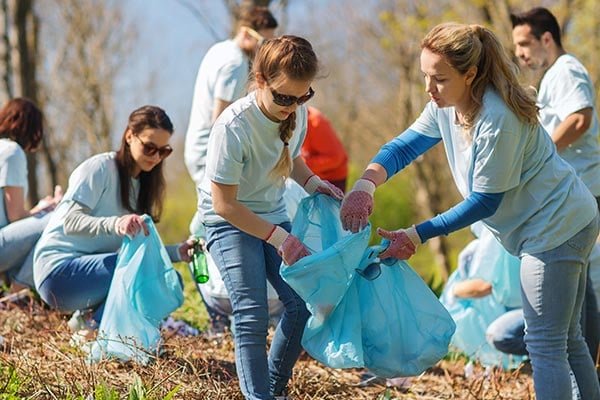In today’s often divisive world, community service provides a powerful way to unite people across differences and restore hope. Volunteering one’s time, skills, and resources to meet local needs delivers immense benefits – not just to recipients but also to volunteers themselves. It builds empathy, broadens perspectives, and strengthens communities.
With busy modern life, it’s easy to believe we don’t have enough time to contribute. Yet research reveals that dedicating even small amounts of time to volunteering significantly enhances well-being and social connection.
In this post, I will explore the profound positive impacts of community service by highlighting inspiring examples, scientific findings, and easy ways to get involved. Read on to understand how helping others paradoxically helps ourselves.
Volunteering Combats Negative Health Impacts of Loneliness
Loneliness poses significant dangers to physical and mental health. But, studies show volunteering just two hours per week can decrease loneliness and depression. Contributing time to food banks, homeless shelters, senior centers, animal rescues, or other deserving causes provides meaningful social connection.
For example, an online msw student could volunteer at a youth mentoring organization. Through working side-by-side with others toward a common goal, volunteers satisfy our human need for purpose and belonging. Two hours goes a long way!
Volunteering Lowers Risk of Memory Loss in Elderly
For older adults, staying socially and mentally active protects against cognitive decline. Research reveals those who volunteer have lower rates of memory loss and dementia. By engaging with others, using skills, and learning new things, volunteering keeps minds sharp.
Volunteering also combats social isolation, a risk factor for cognitive impairment. Organizations across communities offer diverse volunteer roles suitable for seniors. From tutoring kids to serving museum visitors, older adults can stay sharp through service.
Volunteer Work Significantly Boosts Happiness
Many assume volunteering requires grueling sacrifice. However, research shows helping others delivers perhaps the most efficient boost in happiness and life satisfaction. A 2018 randomized controlled trial found just two hours of volunteering per week caused significant spikes in reported happiness after six weeks.
Generosity’s effects on mood exceeded gains from self-focused pleasures like material purchases. Other studies reveal volunteer work substantially increases positive emotions like joy, hope, and satisfaction.
Volunteering Provides Work Experience to Get Ahead
Seeking that first job out of college or a career change later in life? Volunteer work provides the experience needed to get hired in competitive job markets. Serving at nonprofits builds skills and showcases competencies to employers.
Young job seekers can gain experience in areas like communications, event planning, research, tech, and more. Adults changing careers can demonstrate new abilities outside their resumes. Volunteering expands networks, too. Nonprofit staffers make great references and often know where local jobs exist.
Volunteering Teaches Interpersonal Skills
Volunteering develops the interpersonal or “soft” skills coveted by employers. Working collaboratively with diverse community members requires communication, conflict management, empathy, and more. These tools serve volunteers well in personal and professional contexts.
Volunteering also builds leadership capabilities by empowering ordinary citizens to guide change. Whether leading a food drive or fundraising event, these opportunities help volunteers practice skills to better work with and inspire others.
Volunteering Advances Career Opportunities
Volunteer service that aligns with your career goals can directly open new doors. For example, those aspiring to teach can volunteer to tutor students or lead educational activities. Those hoping to work in healthcare can volunteer at clinics or hospitals.
Not only does this build specific skills, but it also grows professional networks and community reputations. Demonstrated commitment to service and people’s welfare gives a career boost.
Volunteering Develops Cultural Awareness
Volunteering gets people outside their bubbles and interacting with new communities. This builds cultural awareness and corrects assumptions. Working directly with marginalized populations like immigrants, disabled folks, or prisoners fosters compassion.
Volunteering in diverse neighborhoods exposes people to fresh perspectives. They see challenges others face and realize “we’re more alike than different”. This empathy remains even after service ends.
Conclusion
Medical studies, employer surveys, and many other data sources confirm volunteering does far more than just help recipients in need. It transforms volunteers themselves in powerful ways – decreasing loneliness, sharpening minds, building skills, and more.
On the collective level, volunteering fortifies the social fabric of communities. It represents an act of hope anyone can perform regardless of differences. Begin reaping volunteering’s countless personal, professional, and public benefits. Your service helps the world but also profoundly helps you.
Author Bio
Jamshaid Ali
Since 2015, I have been honing my skills as a technical writer, author, and blogger. While initially starting as a personal blogger, I soon found my true passion lies in writing about technology, news, and gadgets. As an industry watcher, I strive to stay at the forefront of the latest features and developments. My enthusiasm for all things tech drives me to provide engaging content, keeping readers informed about juicy tech news and everything related to gadgets, Check motorcyclehelmethub.com









